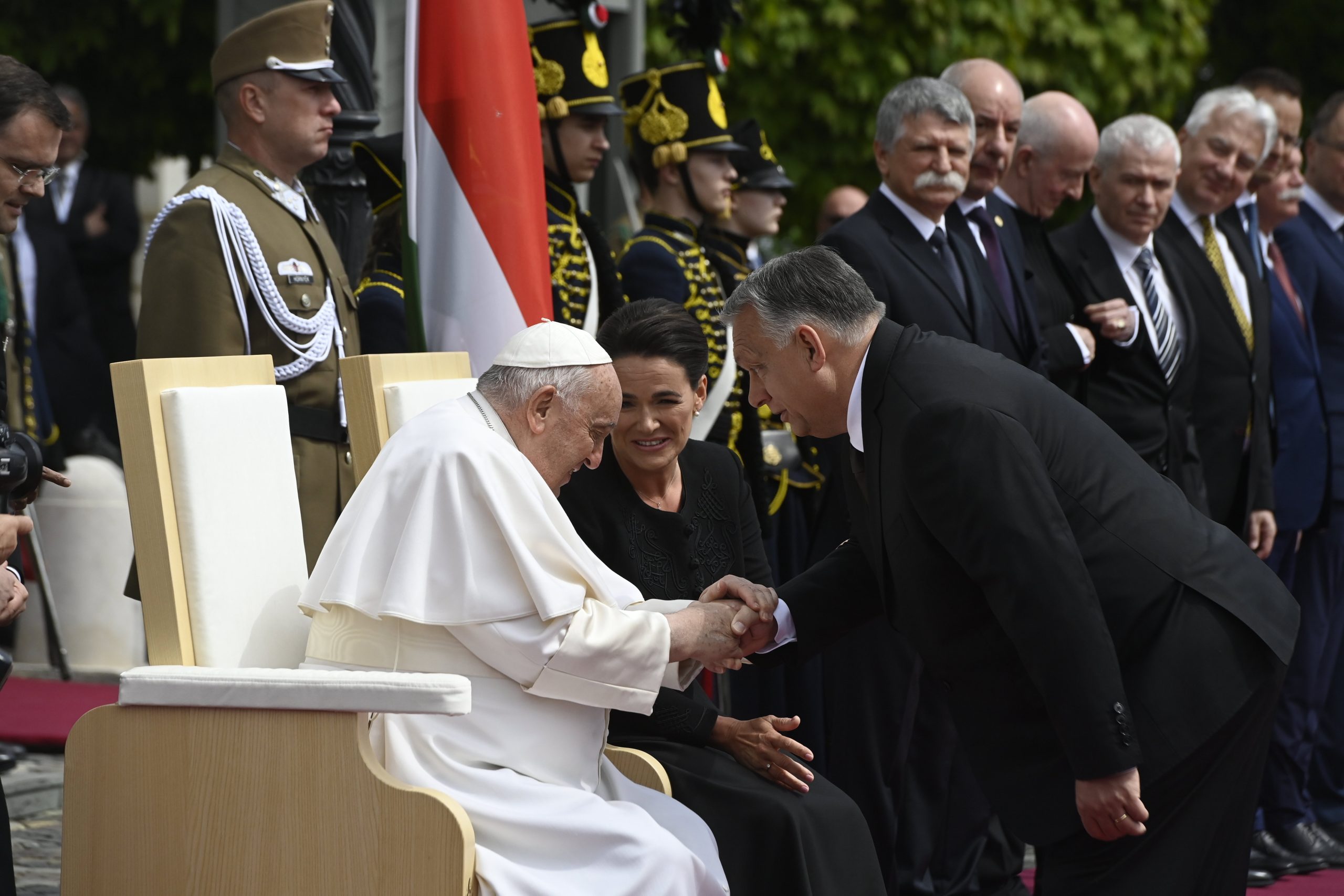
Military parade held for Pope Francis at Buda Castle.Continue reading
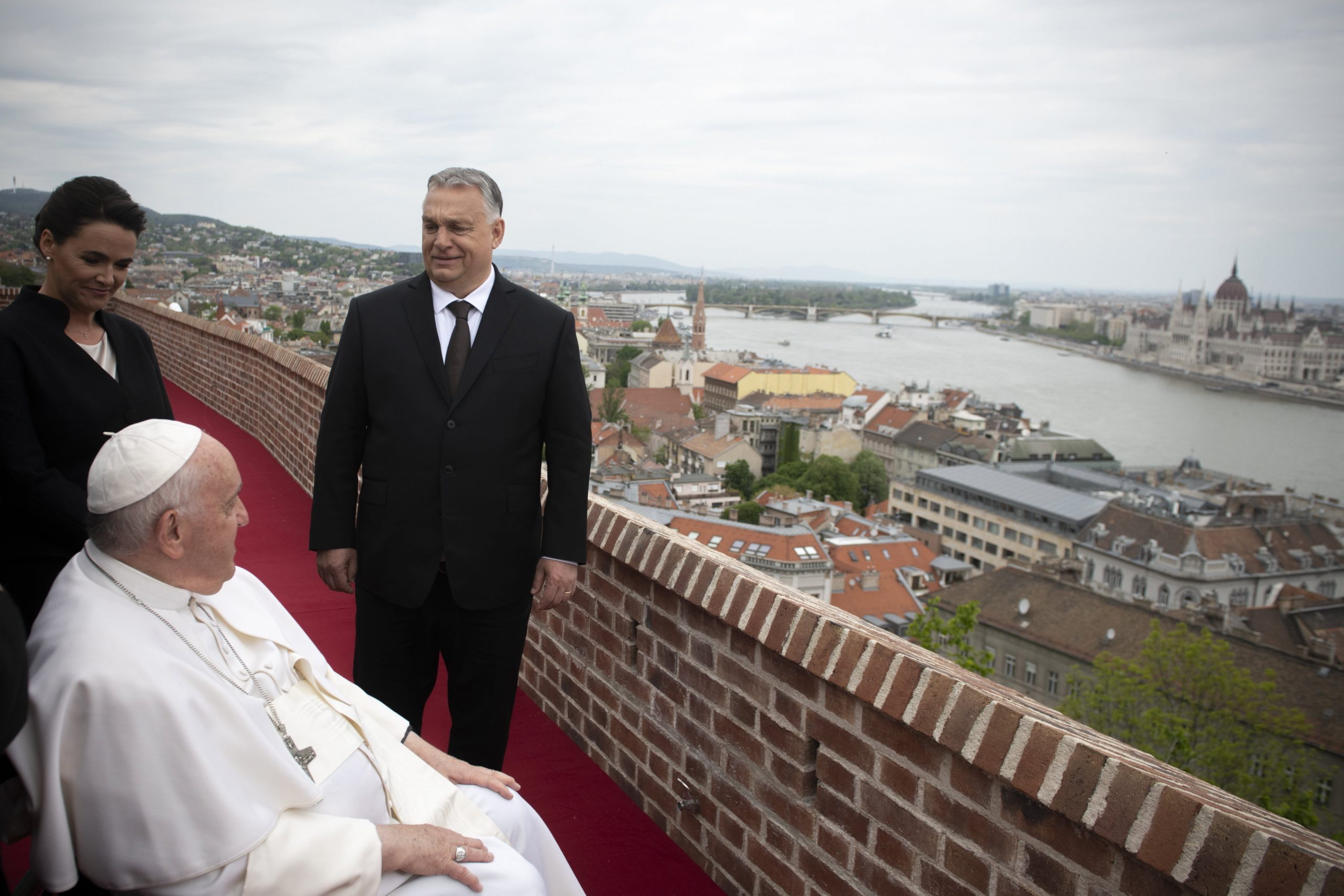
In the world in which we live, we must watch the chorus singing the dream of peace sadly fade away, while the soloists of war make their way, Pope Francis said on Friday at the Carmelite monastery in Budapest, meeting representatives of state authorities, society and the diplomatic corps.
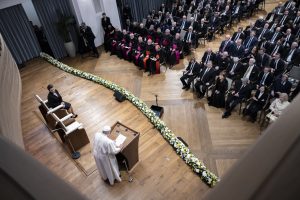
Photo: MTI/Miniszterelnöki Sajtóiroda/Fischer Zoltán
Pope Francis stressed that peace will never come from the pursuit of strategic interests, but from a policy that is able to put everyone’s interests first, looking after people, the poor and the future.
In the words of Robert Schuman, one of the founding fathers of the European Union, “world peace can only be preserved if we make creative efforts commensurate with the threats to it”. In the present historical period, we are facing countless threats, but where are the creative efforts for peace?” he asked, referring to Ukraine.
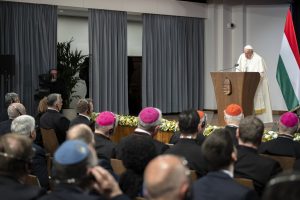
Photo: MTI/Miniszterelnöki Sajtóiroda/Fischer Zoltán
The head of the Church said that
international politics, rather than solving problems, is fanning tempers, forgetting the maturity achieved after the horrors of war, and regressing into a kind of “war infantilism”.
Pope Francis stressed the fundamental role of Europe in the current situation, representing “the common memory of humanity”, saying that the continent’s vocation is to gather together those who have been separated, to welcome peoples and to keep no one forever as an enemy.
He said it was essential to rediscover the “European soul”: the enthusiasm and the dream of the founding fathers, who were able to look beyond their own times, beyond national borders and beyond immediate needs, and to develop a diplomacy capable of creating unity rather than widening divides. Pope Francis also pointed out that in a Europe of 27 nations, what is needed is harmony, a whole that “does not overwhelm the parts, and parts that fit well into the whole”.
In this respect, he cited the wording of the Hungarian Fundamental Law as indicative: “We believe that individual freedom can only flourish in cooperation with others” and “We believe that our national culture is a rich contribution to the diversity of European unity”.
I am thinking of a Europe,” he continued, “that does not become hostage to its parts and victim of self-referential populism, but that does not become a liquid, even gaseous, representative of a kind of abstract supranationalism that ignores the lives of peoples.
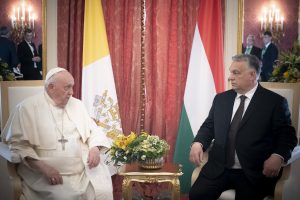
Photo: MTI/Miniszterelnöki Sajtóiroda/Benko Vivien Cher
It is a low road to ‘ideological colonialism’ that obliterates differences, such as the so-called gender culture, or puts narrow notions of freedom before the reality of life, boasting, for example, the right to abortion as an achievement. Instead, we need a person-centered and people-centered Europe with effective birth and family policies,” he said, praising Hungary’s “carefully crafted” family policy.
Pope Francis said that the Chain Bridge, made up of many links, helps us to imagine a Europe made up of many different links that find their strength in solidarity. Christian faith helps to build such a Europe, he stressed, underlining Hungary’s role in building bridges, where different denominations live side by side, without conflict, respectfully and constructively.
Finally, the head of the Church spoke of Budapest as the city of saints, mentioning first of all St Stephen. Hungarian history is marked by the sanctity of life, not only of a king, but of a whole royal family, the monarch, his wife, Blessed Gizella, and his son, Saint Imre.
He said that King Stephen’s exhortations to Saint Imre were a kind of “spiritual testament for the Hungarian people”. He quoted the passage on the welcome of strangers: “I ask you, in all things and in everything, to be merciful not only to your brotherhood and kinship, or to the chiefs, or to the rich, or to your neighbor and the resident, but also to strangers, relying on love”.
St Stephen is guided by a sincere Christian spirit when he writes: “the practice of charity leads to supreme happiness”, and concludes with “be gentle so as never to fight against justice”, he said, and then pointed out: St Stephen thus “inextricably links truth and gentleness”.
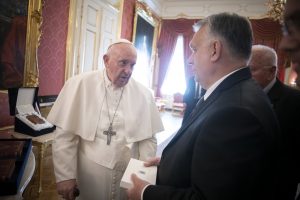
Photo: MTI/Miniszterelnöki Sajtóiroda/Benko Vivien Cher
This is the great lesson of the faith:
Christian values cannot be witnessed to in a rigid and closed way, because the truth of Christ means gentleness and generosity in the spirit of the Beatitudes. This is the source of the Hungarian folk goodness, which is also expressed in certain expressions in the vernacular,
said the head of the Church, citing the Hungarian phrases “it is good to be good” and “it is better to give than to receive” as examples.
The head of the church pointed out that the section of the Fundamental Law which states that “we profess the duty to help the fallen and the poor” refers to the continuation of the history of Hungarian holiness of life.
Pope Francis thanked the country’s leaders for their support for charitable and educational institutions inspired by Christian values, and for the concrete help they have given to Christians around the world, especially in Syria and Lebanon. The fruitful cooperation between the state and the church is fruitful, he said, but it must maintain the right boundaries to keep it that way, he warned.
“It is important for all Christians to remember this, to hold the Gospel as a reference point, to hold fast to the free and liberating decisions of Jesus and not to be bound by the particular logic of power,” he said, calling healthy secularization a good thing in this respect, not the same as widespread secularization, allergic to all sacral aspects and sacrificing itself on the altar of profit.
On the “complex” issue of inclusion, which is “a subject of much debate”, he stressed that the fundamental attitude of Christians cannot be different from that left by St Stephen. “With Christ in mind, who is present in the midst of many of our desperate brothers and sisters fleeing conflict, poverty and climate change, we must address the issue without excuses or delay”.
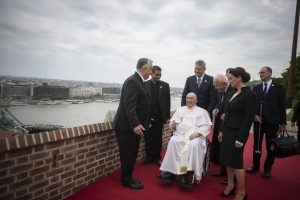
Photo: MTI/Miniszterelnöki Sajtóiroda/Benko Vivien Cher
He added that it is an issue that we must face together, collectively, because sooner or later its effects will affect everyone. He called it urgent to develop a common, safe and legal way forward to face a fate-turning challenge that cannot be contained by rejection, but only by acceptance, so that “we can create a future that will not be if we do not have a common future”. And this calls to the fore those who follow Jesus and want to imitate the example of the evangelical witnesses,” the head of the Church said.
Before his meeting with Catherine Novak, Pope Francis wrote in the guest book of the Alexander Palace:
I come as a pilgrim and a friend of Hungary, a country rich in history and culture. From Budapest, the city of bridges and saints, I think of all Europe and pray that in unity and solidarity it will continue to be a home of peace and a harbinger of welcome in our days,
he added.
Featured Image: MTI/Miniszterelnöki Sajtóiroda/Benko Vivien Cher